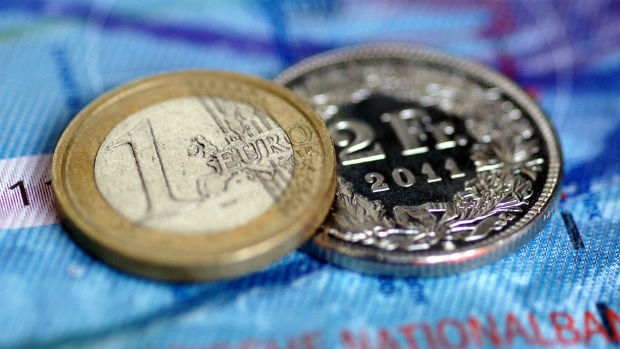Swiss franc soars after chaotic end to euro cap
Why market turmoil followed decision to lift system pegging value of Swiss franc to the euro

A free daily email with the biggest news stories of the day – and the best features from TheWeek.com
You are now subscribed
Your newsletter sign-up was successful
The Swiss franc has leapt by almost 30 per cent after the country's central bank surprised markets by scrapping a cap on its value against the euro.
Analysts said that the move would hurt Swiss exporters, damage the country's economy and increase the risk of deflation in an economy that is already struggling to grow.
Swiss stock markets fell by more than 10 per cent in response to the currency market turmoil.
The Week
Escape your echo chamber. Get the facts behind the news, plus analysis from multiple perspectives.

Sign up for The Week's Free Newsletters
From our morning news briefing to a weekly Good News Newsletter, get the best of The Week delivered directly to your inbox.
From our morning news briefing to a weekly Good News Newsletter, get the best of The Week delivered directly to your inbox.
What happened?
"In chaotic scenes described as 'complete carnage', the franc jumped by almost 30 per cent in a few minutes to break past parity and trade as high as 0.8052 to the euro," The Times reports. "Later in the morning, a euro was worth 1.04 francs."
Under the capping system abandoned this morning, the exchange rate was held at 1.20 Swiss francs to the euro.
How did the bank react?
A free daily email with the biggest news stories of the day – and the best features from TheWeek.com
In an attempt to prevent the franc rising further, the Swiss National Bank cut interest rates to minus 0.75 per cent. Negative interest rates were introduced in December in an attempt to reduce the attractiveness of the Swiss franc to investors. They apply only to deposits held commercial institutions, not to individual savers, The Guardian says.
How did markets react?
Not well. The change was described as "extremely violent and totally unexpected" by IG's chief market analyst, Alexandre Baradez.
"It is sparking panic across all asset classes," he said. "It suddenly revives the risk of central bank policy mistakes, right when central bank action is what is keeping equity markets going."
Why was the exchange rate cap abandoned?
The Times reports that Switzerland took the decision because "it could no longer hold out against the tide of money about to head its way as the European Central Bank prepares to start quantitative easing and investors pour out of riskier markets like Russia".
What will happen in the longer term?
The sudden spike in the value of the Swiss franc will reduce the cost of imports, increasing the risk of deflation. It will also push up the price of Swiss exports.
The central banks decision to cut interest rates yet further is an attempt to stave off both of those negative effects.
However, Jennifer McKeown of Capital Economics told the Daily Telegraph that exchange rate volatility could hurt Swiss business.
"A further appreciation against the euro could have serious implications for the economy given that Switzerland has typically sent nearly half of its exports to the eurozone and about 10pc to the US," she said.
Creative Commons image by Martin Abegglen